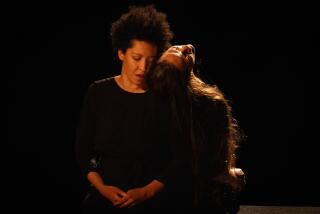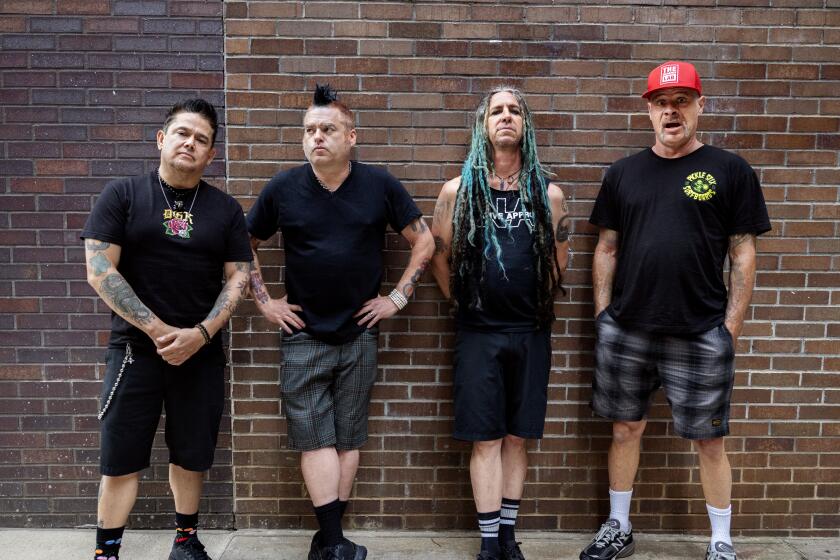JAZZ REVIEW : Playboy Festival Sings With Diversity
From the first strains of choral pop vocal by the Long Beach Polytechnic High School Jazz Ensemble to the final indigo rideout of Ray Charles and the Raeletts plowing their way through “What I Say,” the 13th annual Playboy Jazz Festival at the Hollywood Bowl on Saturday seemed to be broadly based on one principle: When in doubt, sing.
Of the 10 acts in the 8 1/2-hour affair, five were essentially vocal. Three others introduced guest singers. But within these parameters there was enough diversity to remind us of the rich stylistic and idiomatic range of jazz singing, from the Louis Armstrong growl of Kermit Ruffin, with the Rebirth Brass Band of New Orleans, to the Africana of Miriam Makeba; from the primordial 1920s scatting of Patti Hollie with the Mercer Ellington Orchestra to the contemporary balladry of Dianne Reeves, dedicating “For All We Know” to the memory of Stan Getz.
As has always been inevitable, the early acts worked for a few thousand attentive listeners. But by the time the almost 18,000 capacity had been reached, the beach balls were bouncing around the Bowl, the sun was setting and the crowd was becoming a tad restless. That meant the crowd gave comparatively short shrift to South African singer Makeba, her three backup singers, her rhythm quintet and even to Dizzy Gillespie, who made a brief cameo appearance in her last two songs. Ironically, Dianne Reeves, who opened later with two African-flavored songs, was better received.
The Long Beach choir, 20 strong, proved two points: Group singing requires rehearsal and obedience, but solo vocals call for inspiration and talent. Singing jazz standards of several decades (Gillespie’s “Oo Pa Pa Da,” Chick Corea’s “Spain”) they succeeded in keeping the solos to a minimum and blending impressively in challenging arrangements.
Group vocals also dominated in a somewhat strange offering under direction of emcee Bill Cosby. Despite the presence in his band of such potent soloists as pianist Mulgrew Miller, saxophonist Jimmy Heath and the promising young trumpeter Rebecca Franks, Cosby concentrated on gospel vocals by Mavis Staples, Clint Holmes and a 12-piece choir.
This odd mix did not prevent alto saxophonist Bobby Watson from making a potent impression. His solos left little doubt that within a year he will be on the jazz magazine covers. Cosby, who conducted, did not play drums until later in the evening, when he sat in during an innocuous set by Spyro Gyra.
Elvin Jones, who spent six formative years as drummer with the John Coltrane Quartet, presented a powerful group highlighting two tenor saxophonists, one of whom was Coltrane’s son, Ravi. The visual image of his father, he is a rapidly maturing, well-organized soloist on tenor and soprano, contrasting with the more energy-oriented sounds of his partner, Sonny Fortune.
At the other end of the instrumental spectrum the Rebirth Brass Band suggested a spinoff of the Dirty Dozen Band, heard here at an earlier festival. These New Orleans youths, all in their late teens or early 20s, were led by the very dominant tuba player Philip Flazier. After opening improbably with a Charlie Parker tune, “Au Privave,” they moved on to the Armstrong hit “It’s a Wonderful World,” and wound up with the novelty blues “Rag Mop.” That they play out of tune somehow adds authenticity to their infectiously primitive Bayou polyphony.
More valid by today’s standards was the Harper Brothers Sextet, reviewed here recently and again offering the best and brightest in post-bop sounds. The trumpet of Atlanta’s Philip Harper furnished a reminder that you don’t have to be from New Orleans to make it on today’s youth jazz scene. The Harpers tossed in two welcome guest stars, veteran organist Jimmy McGriff and the excellent Los Angeles singer Ernie Andrews.
The Mercer Ellington Orchestra got off to a rough start, with a bass sound by J. J. Wiggins that almost overwhelmed the entire 17-piece ensemble. The balance improved later as Mercer Ellington pressed the reggae button with “Queenie Pie,” a charming calypso he co-wrote with his father. Tommy James played the steel drum effects on synthesizer.
The set grew in strength as the maestro dipped back into Duke’s early efforts, providing Patti Holley with a chance to recapture the spirit of wordless blues singing in “Creole Love Call” and the scat chorus on “Hot and Bothered,” two pieces Duke recorded 63 years ago.
The Ellington finale was a sweet, “The Three Black Kings,” also completed by Mercer from odds and ends left over at his father’s death. Spectacular use was made of a stylish dancer, Cerise Johns.
Ray Charles seemed curiously disengaged as he closed the opening day’s program in the two-day festival.
More to Read
The biggest entertainment stories
Get our big stories about Hollywood, film, television, music, arts, culture and more right in your inbox as soon as they publish.
You may occasionally receive promotional content from the Los Angeles Times.










